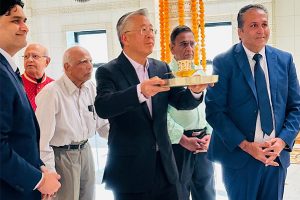Former US Army soldier Charles Robert Jenkins, who defected to North Korea in the 1960s and later lived in Japan, has died at the age of 77, a media report said on Tuesday.
Originally from North Carolina, Jenkins in January 1965 crossed the barbed-wire fence of the Korean Demilitarised Zone with the aim of avoiding an alleged transfer to Vietnam, Efe quoted a Kyodo news agency report.
During his almost 40 years in North Korea, Jenkins starred in anti-US propaganda films and worked as an English teacher.
In one of those classes, he met his wife Hitomi Soga, one of the Japanese women who were kidnapped by North Korean spies in the 1960s to train the regime’s secret agents.
Jenkins married her in 1980 and had two daughters with her.
Soga was released in 2002, shortly after the then Japanese Prime Minister Junichiro Koizumi visited Pyongyang to gather information about the Japanese citizens kidnapped by North Korea to serve as Japanese teachers for its spies.
Soga returned to Japan along with two abducted couples, whose children, born in North Korea, were finally authorised by the regime to reunite with their parents, following Koizumi’s second visit to the North Korean capital two years later.
The return of Jenkins and the two daughters of the couple, Mika and Brinda, was delayed by the ex-soldier’s fear of being arrested by US authorities upon arriving in Japan.
Finally, in July 2004, Jenkins arrived in Japan and was tried for desertion by a US military court.
Due to his advanced age, bad health and the time elapsed since the events took place, Jenkins was dishonourably discharged and sentenced to 30 days of confinement at the Yokosuka military prison near Tokyo.
Jenkins said that in the first 15 years in North Korea he “lived like a dog,” suffering beatings from the North Korean military.
From December 2004, the family resided on the island of Sado, Soga’s hometown.











